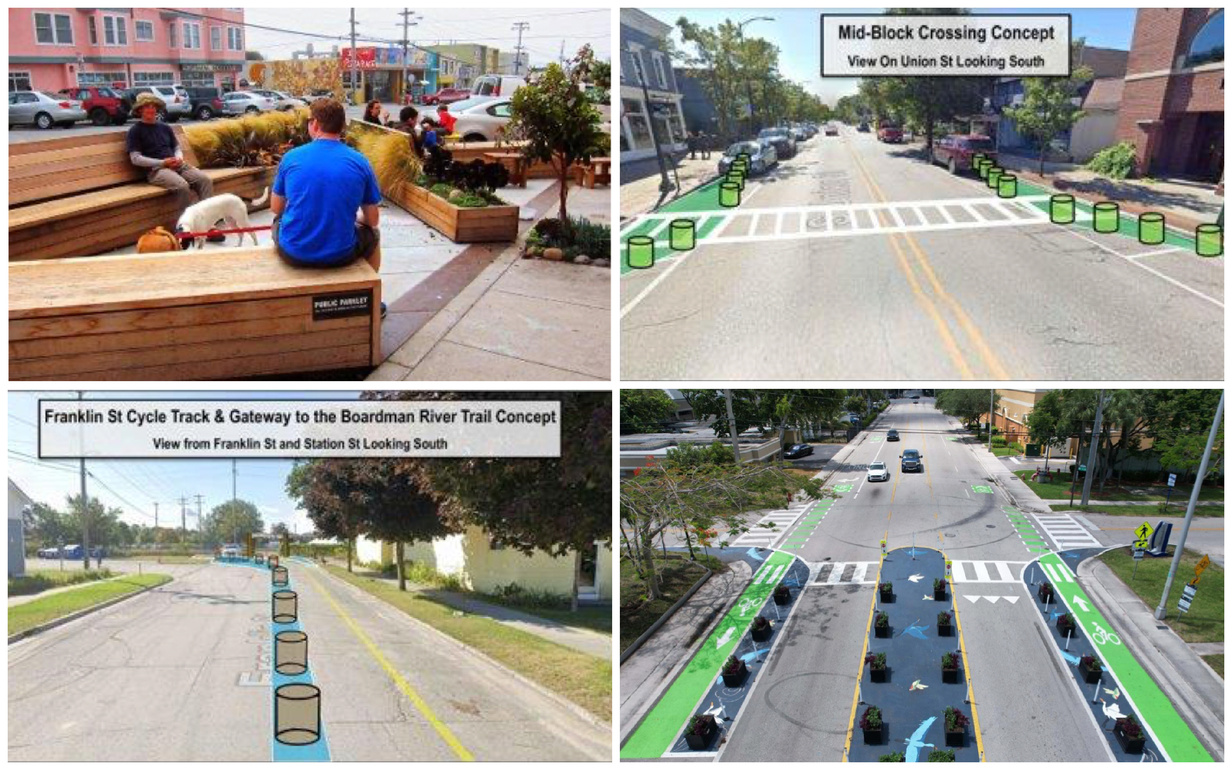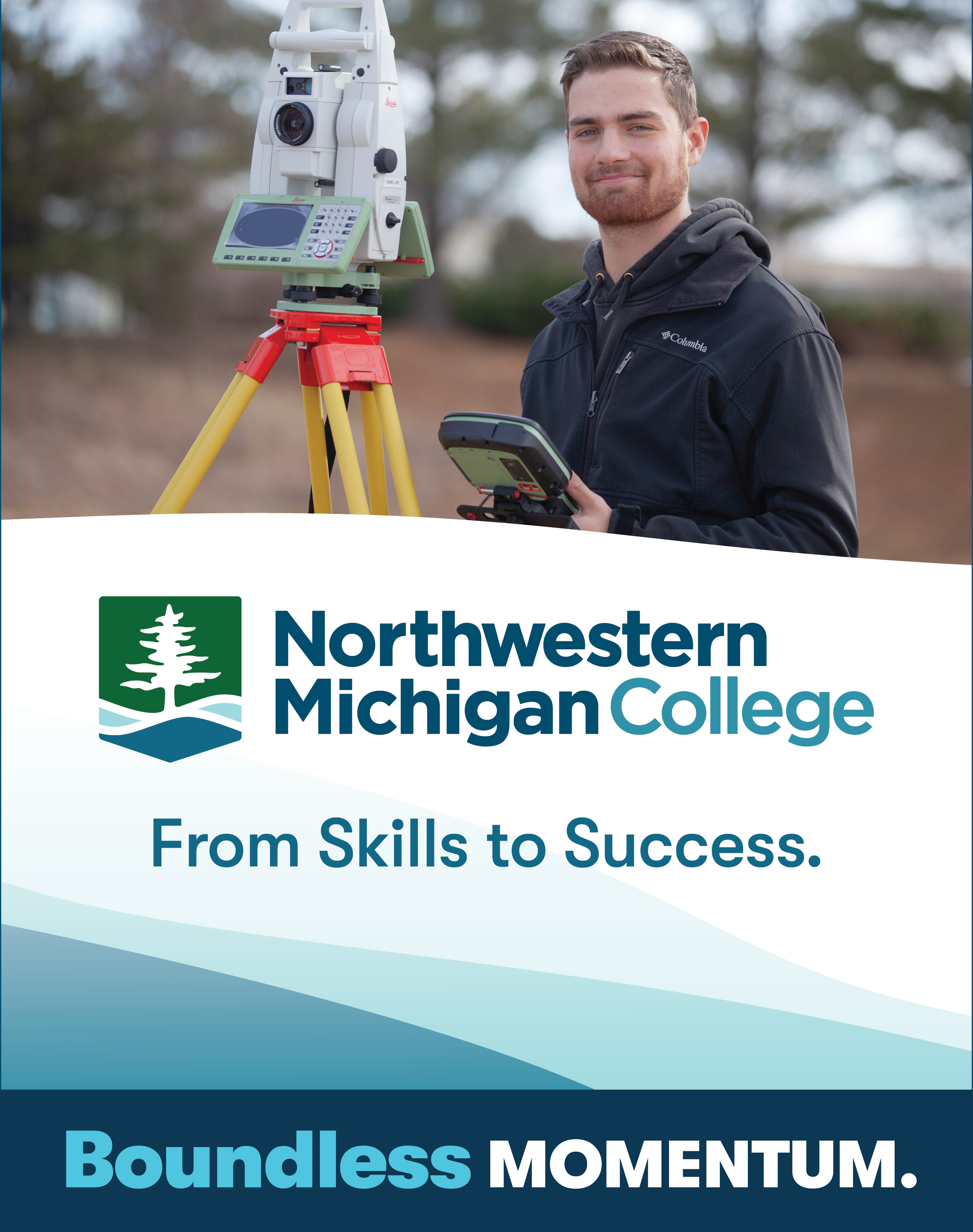
City Gears Up For Next Major Round of Master, Mobility, TART Plan Public Engagement
By Beth Milligan | March 14, 2023
The City of Traverse City is gearing up for another major round of public input this week on its new mobility action plan and the redesign of the downtown TART Trail. City commissioners and planning commissioners received updates on both projects in a special joint study session Monday, including four pilot projects planned for this spring to calm traffic on Eighth, Union, Fourteenth, and Franklin streets. They also heard about meetings planned in April to get more resident feedback on desired improvements to city neighborhoods as part of the new city master plan.
City staff and consultants Progressive AE will host a public open house Wednesday from 3pm to 7pm at The Alluvion in the Commongrounds building on the mobility action plan. The city is working toward creating its “first-ever comprehensive plan towards building a non-motorized network throughout the community,” which will “guide infrastructure improvements in the future,” according to a city release. The open house will show the first draft of a proposed mobility network for Traverse City.
Suzanne Schulz of Progressive AE reviewed maps with city leaders Monday that showed existing bike and sidewalk networks in Traverse City, traffic volumes in those networks, bicyclist and pedestrian crash data, missing sidewalk segments, and intersections where existing pedestrian signals or signs are in place. Based on that data, a series of recommended bike and crossing improvements have been identified throughout the city. Open house attendees Wednesday will have an opportunity to review those maps and recommendations.
Some sections of the map are still under heavy debate. Schulz said a leadership committee working on the plan was torn, for example, on whether designated bike paths should remain in place on the main shopping blocks of Front Street. The existing bike lanes are in direct conflict with vehicle door lanes, she noted, and many downtown users said they’d like to see sidewalks widened on Front Street. While City Commissioner Tim Werner rejected the idea that cyclists should be forced to share the same lanes as vehicles on Front Street, Schulz said cars travel slower in that corridor – typically 15 miles per hour – and that the city could prioritize bike lanes on nearby State Street and the TART Trail along Grandview Parkway to facilitate cycling traffic while also creating an improved pedestrian experience on Front Street.
While every street should accommodate all modes and users, Schulz said, limited right-of-way also means “you do have tradeoffs” when considering design layout. Open house attendees will be able to engage in a street segment-building activity to better understand how different bike, vehicle, walking, and transit options impact available space within corridors.
The mobility action plan leadership team has also identified four temporary projects, called “tactical engagement projects,” to demonstrate how city streets can be redesigned to calm traffic and better accommodate different user groups (pictured). On Eighth Street just east of Garfield Avenue, the plan calls for temporarily removing on-street parking to allow for improved streetscaping, outdoor seating, and placemaking features. “It’s kind of a sleepy area,” Schulz noted. On Union Street from Front Street to Old Town, mid-block crossings, plantings, signage, and bumpouts with public art through a partnership with the Traverse City Arts Commission are planned.
On Fourteenth Street from Veterans Drive to Union Street, a temporary median is recommended to calm traffic and improve pedestrian crossing visibility, especially near Thirlby Field. A fourth project on Franklin Street calls for providing a protected bike lane along the street and offering an improved connection to the Boardman Lake Trail. The leadership team is working with city staff on costs and engineering ahead of a targeted May rollout of the example projects. Simultaneously, consultants and city staff are working toward an August completion and adoption of the new mobility action plan.
Cyclists and pedestrians were also a topic of discussion in an update on the TART Trail redesign Monday. Progressive AE is assisting the city, Traverse City Downtown Development Authority, and TART Trails on redesigning and expanding roughly 2.5 miles of trail from West End Beach to Bryant Park. The project, estimated to cost $8.5 million, would double the width of the TART in spots and segment it out into a 10-foot-wide cycling trail and a six-foot-wide pedestrian trail. Schulz said that the most difficult section to redesign so far has been the area around the Delamar hotel, given the hotel’s operational needs, the steep grading in that area, and the adjacent Grandview Parkway/East Front Street intersection.
However, progress is continuing on the design, and consultants and staff are ready for another round of public input this week to further refine the plan. A virtual session focusing specifically on the downtown and base of Old Mission Peninsula sections of the trail is planned for Wednesday from 5:30 to 7:30pm (Zoom link here). That will be followed by two in-person sessions Thursday: one on the downtown trail section from 3pm to 4:30pm at the Governmental Center and one on the base of Old Mission Peninsula trail section from 6pm to 7:30pm at the NMC Innovation Center.
Schulz said public feedback to date has shown a preference for extending the trail down Peninsula Drive along the bayfront side of the road to allow direct access to Bryant Park without having to cross the road. Staff and consultants have also been looking at stormwater improvements along the trail, Schulz said, and have had discussions with the Grand Traverse Band of Ottawa and Chippewa Indians about installing interpretive signage or artwork to celebrate the heritage of the area that the trail crosses.
Consultants from Beckett & Raeder and Placecraft, two firms assisting the city with its master plan rewrite, also presented to city commissioners and planning commissioners Monday. They reviewed feedback from recent input sessions on how tourism could affect Traverse City in the coming years – and what residents want city leaders to do about it – as well as housing data from across the community. The consultants are planning to hold a series of meetings across Traverse City April 19-21 – with locations and times to be announced soon – to hear from both official and unofficial neighborhood groups about what they’d most like to see “preserved or enhanced or transformed” in their sections of the city under the new master plan.
The city is also planning an April 26 workshop at Hickory Hills focused on a handful of key city corridors, including Fourteenth Street, Eighth and Garfield, and Munson Avenue between NMC and the city limits. Details for upcoming meetings – as well as recaps of past sessions – are posted on the city’s master plan website.
Pictured, clockwise from top left (proposed temporary street projects): Example of a streetscape redesign that could be used on Eighth Street; proposed Union Street mid-block crossing; example of a median that could be used on Fourteenth Street; proposed protected bike lane on Franklin Street.
Comment






